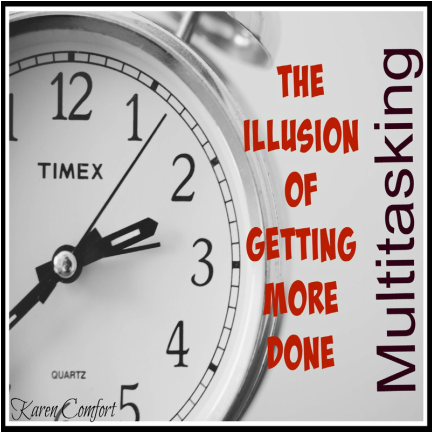|
Our brains weren't built to multitask. Our brains are designed to focus on one thing at a time, and bombarding them with information only slows them down. MIT neuroscientist Earl Miller notes that our brains are "not wired to multitask well... when people think they're multitasking, they're actually just switching from one task to another very rapidly. And every time they do, there's a cognitive cost." This constant task-switching encourages bad brain habits. When we complete a tiny task (sending an email, answering a text message, posting a tweet), we are hit with a dollop of dopamine, our reward hormone. Our brains love that dopamine, and so we're encouraged to keep switching between small mini-tasks that give us instant gratification. This creates a dangerous feedback loop that makes us feel like we're accomplishing a ton, when we're really not doing much at all (or at least nothing requiring much critical thinking). Multitasking lowers your work quality and efficiency. Multitasking makes it more difficult to organize thoughts and filter out irrelevant information and it reduces the efficiency and quality of our work. A study at the University Of London showed that multitasking has also been found to increase production of cortisol, the stress hormone. Having our brain constantly shift gears pumps up stress and tires us out, leaving us feeling mentally exhausted (even when the work day has barely begun). One of the biggest instigators of multitasking mayhem? Our inboxes. The constant thrill of a new bolded email in our inbox keeps us ever-distracted. A McKinsey Global Institute Study found that employees spend 28 percent of their workweek checking emails. Email is problematic, but texting is even worse, demanding even more immediacy than email, having us check it more adamantly as a result. Protect yourself from the multitasking mental massacre by establishing an e-mail checking schedule. Commit yourself to checking emails only three times a day, (maybe when you get into work in the morning, at lunch time, and before leaving work at the end of the day). Turn off texting notifications and choose specific times to check your phone as well. The lesson? Multitasking is not a skill to add to the resume, but rather a bad habit to put a stop to.
0 Comments
Your comment will be posted after it is approved.
Leave a Reply. |
Disclaimer: This website is for informational and educational purposes.
Any and all blog content represents a synthesis of empirical information found on the internet, of my own personal opinions, and my professional experiences. Nothing posted reflects or should be considered professional advice. Interaction with me via the blog does not constitute a professional or therapeutic relationship. For professional and customized advice, you should seek the services of a licensed mental healthcare professional. I do not assume liability for any portion or content of material on the blog and accept no liability for damage or injury resulting from your decision to interact with the website. Archives
October 2023
Categories
All
|
